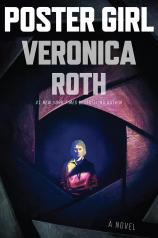Poster Girl
Review
Poster Girl
If you only know Veronica Roth as the author of the wildly popular Divergent series, her latest novel, POSTER GIRL, will seem a bit like familiar territory. However, here Roth mellows the teen girl dystopian survival trope so that political and personal nuances can shine through the overarching battle against the oppressive government. While there is a mercurial heroine facing tough choices and a requisite romance, the book is a worthwhile work of speculative fiction that stands on its own against similar stories.
Set in the near future in the Seattle-Portland megalopolis sector of what was the United States, POSTER GIRL is about a political prisoner named Sonya Kantor. Sonya’s father had been a powerful figure in the previous government, the Delegation, before it was overthrown by the Triumvirate in a violent revolution. As a young teen, Sonya became the face of the Delegation when she posed for what became the quintessential image of that techno-fascist system.
"An engaging and ultimately entertaining look at power and integrity, POSTER GIRL succeeds in balancing out expected dystopian tropes and characters with thoughtful and humane insights."
When the Delegation fell and as the Triumvirate forces closed in on the Kantor family, Sonya’s father distributed a deadly pill to her mother, her sister, himself and Sonya. Sonya watched her family die and chose to live. Then she ended up sentenced to life imprisoned in the Aperture, a closed complex for Delegation officials and loyalists who survived the revolution. Sonya’s time there is interrupted when her childhood friend, Alexander Price, shows up, declaring that she can gain her freedom in exchange for completing a task for the Triumvirate: find Grace Ward.
Grace was an “illegal second child” under the Delegation and remains unfound and unreturned under the Triumvirate policies. While Sonya is suspicious of the offer of freedom and wary of spending time with Alexander, and despite having no special skills in this kind of investigation, she agrees to help locate Grace. The search takes her through a maze of ideas and technology fueled by underground figures at the shadowy intersections of the Delegation and the Triumvirate. Most compellingly, it takes her through the maze of her own past as she learns about her family’s role in Delegation crimes and deals with her own complicity. Faced with the opportunity to right old wrongs, Sonya finally must confront her family legacy and the truths about those she loved then and loves now.
Big Brother looms large in POSTER GIRL. Sonya understands her world through the Insight, the device that all Delegation citizens had implanted to track them. It rewards and punishes them through DesCoin, creating a societal experiment of behavioral conditioning. Sonya is very much a product of this, and even with all she learns over the course of the story, that conditioning is difficult to shake. But Roth wisely allows her to exist in this psychological uncertainty as she attempts to find out who she is “when no one is watching.” This is a very human tale, albeit one that coexists with supercomputers and proto-cyborg technology.
Secrets, regrets, losses and longings drive Sonya’s story. Despite a seeming complacency, Sonya is strong-willed, smart, creative and driven to seek out at least some semblance of justice for Grace Ward and others. Roth’s light narrative touch belies the hefty themes and complexity here. An engaging and ultimately entertaining look at power and integrity, POSTER GIRL succeeds in balancing out expected dystopian tropes and characters with thoughtful and humane insights.
Reviewed by Sarah Rachel Egelman on October 21, 2022




